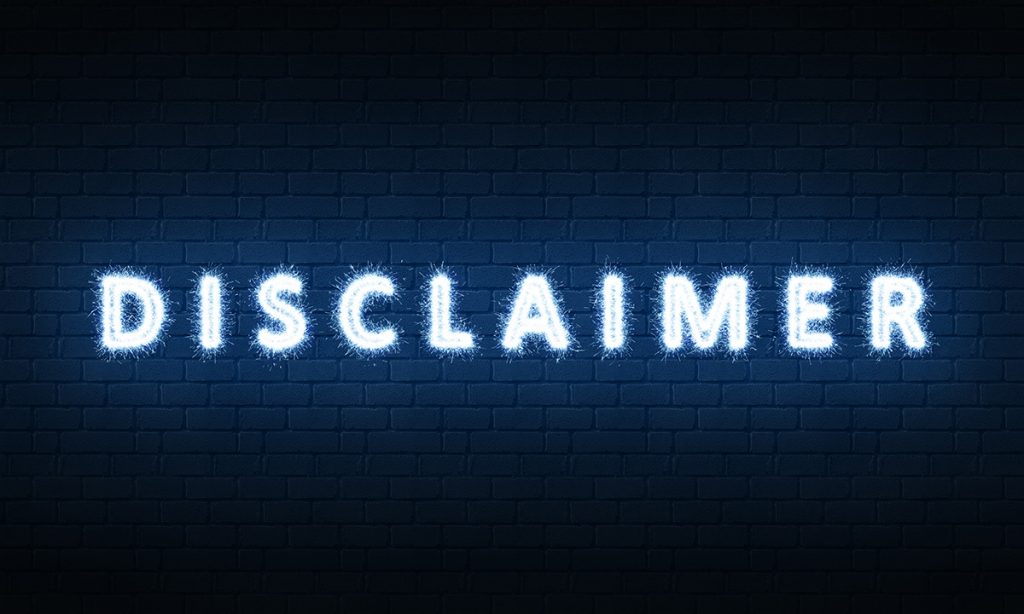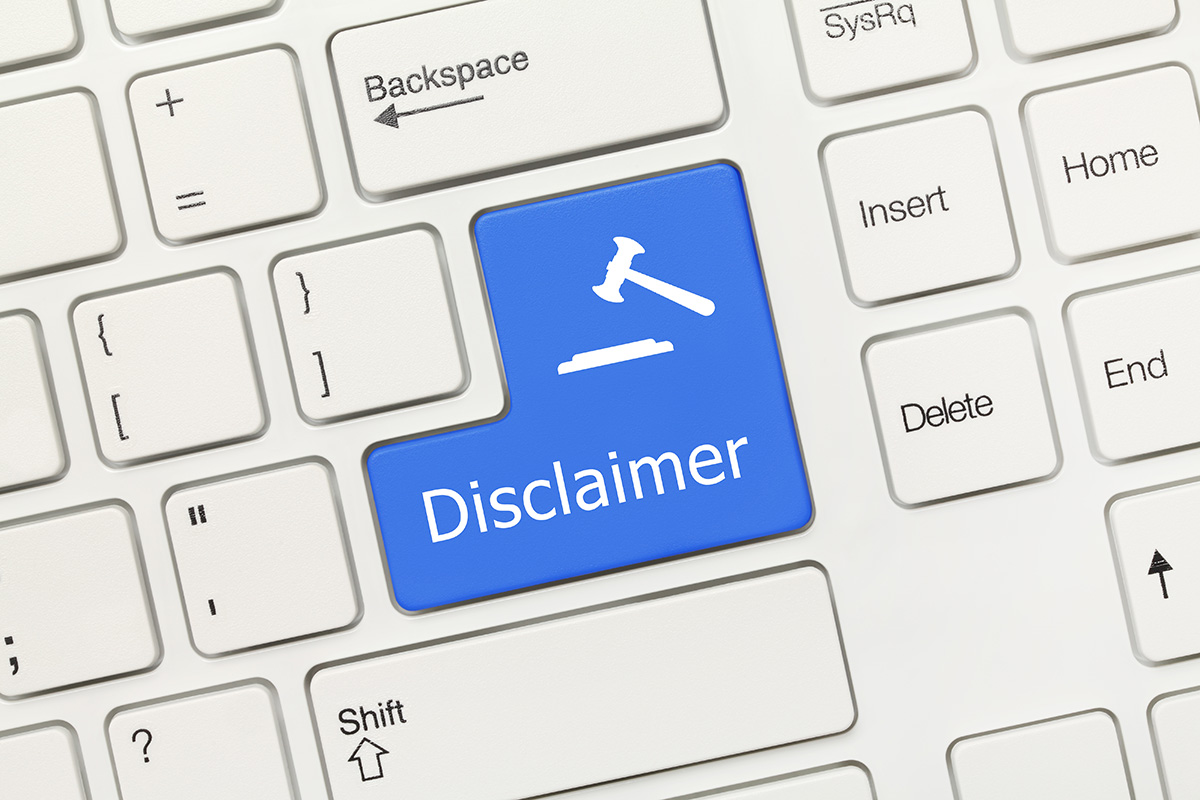Quick take:
- Disclaimers are warnings that protect you from legal liabilities.
- Legal disclaimers may protect you from false information laws.
Your words, whether written or spoken, may land you in legal problems because whenever someone visits your website, in the eyes of the law, you are in a legal agreement with that visitor or client. Consequently, YouTube videos, your blog posts, medical advice, and anything else you share should theoretically be 100% accurate. Furthermore, all users have a right to view your disclaimer policy. If you deny them this right, you cannot use the legal protections disclaimers offer as a defense. If you are a website owner you should know that 18 U.S CODE Statute 35 -Imparting or conveying false information reads, quote:
“whoever imparts or conveys or causes to be imparted or conveyed false information, knowing the information to be false, concerning an attempt or alleged attempt being made or to be made to do an act which could be a crime prohibited by this chapter or chapter 97 or chapter 111 of this title shall be subjected to a civil penalty of not more than $1000 which shall be recovered in a civil action brought in the name of the united states.”
Part (B) intentional misinformation
The second section of the statute says that if you willfully, maliciously, or with reckless disregard for the safety of others, impart false information the punishment is a fine and imprisonment for not more than five years.
How does a legal disclaimer protect you from false information laws?
What risks does your product, service, or information pose to the public? See the thing is someone may sue you for negligence or lack of information, for example, if you sell a hot drink without warning the customers that the drink is skin burning hot, you may be liable to pay damages for any accident that may happen. A good example of this is Liebeck Vs. McDonald’s restaurants. Back in 1994, Liebeck took legal action against McDonald’s after she suffered serious injury from hot coffee. The court jury awarded her $2.86 million in damages, but the judge reduced it to $640,000.
The more popular your website, service, or company becomes, the more likely you are to face frivolous litigation or lawsuits. It may come from the competition, or anyone visiting your site.
When you put up a legal disclaimer, you tell your clients or visitors that you are not liable for anything that might happen if they use your product or follow your information. As mentioned, when someone visits your website or purchases your product you are in a legal relationship with that person. Because of that, the buyer or visitor has a right to take legal action if you fail to mention something important, like in the example above that the coffee is hot.
Expert tips:
Your disclaimer should include warnings such as:
- Access and use of this page or website -does not imply any legal/business relationship between the user and Website Name.
- (website name) we do not assume any responsibility for the information in third-party websites accessed via links.
- We do not assume responsibility for any information on this website.
- Website name -will not assume any liability that may arise from a malfunction in computer equipment or technical problems that may occur.
You know your business, therefore make sure that you cover all your bases.
What are the benefits of putting up a disclaimer?
The benefits of putting up a disclaimer are twofold. One, it minimizes liabilities. Two, it helps you avoid frivolous/unnecessary lawsuits.
What if you work with third-party contractors?
If your website recommends or employs contractors to provide a service, you may face legal actions for the failures of the contractor. For instance, someone may see an ad on your website or you may recommend a service. If the contractor performing the duty fails to deliver or does something else outside the contract agreement, the client may sue you. To prevent this scenario, you need a legal disclaimer that reads, “your company or business -cannot be held responsible if the contractor fails to perform his or her duty.
If you share new content daily or monthly, you must regularly update your disclaimer. This is tedious work, and you may fail to update protection.
Your website’s cookie policy may also be an issue. Why? The EU Cookie Law Requires all websites to ask for consent before sending cookies. The reason being cookies collect user data.
How do you keep track of all this?
One way is to update your policy regularly. and the other is to use services such as Termly. What is Termly?
Termly is a service that helps you to set up and regularly update your disclaimer. The services on offer include:
- Privacy policies.
- Cookie consent solutions
- GDRAP cookie Compliance Scanner.
- Terms and conditions
What is the difference between a disclaimer and terms and conditions
Terms and conditions as the name suggest are rules, or rather a specific framework that visitors or users must abide by when using your website or service. a disclaimer, as mentioned is protection that warns the user about your service or information. It is there to lessen liabilities and prevent unnecessary lawsuits.
Do you need a terms and conditions page and a disclaimer?
Yes, all websites need both protections. Why?
Assume that you share false information and do not have a section reading, “we are not accountable for your actions, especially if you try to use this information in a dark room.” courtesy, Uncyclopedia. Or something similar, you may face a lawsuit.
What is vital to remember is that sharing false information and hoaxes under the US code. 1038 “False Information and Hoaxes” is a punishable offense. The punishment gets worse if a person gets injured while following your false claims.
You may be fined and imprisoned for not more than five years, imprisoned for not more than twenty years if the victim suffers serious bodily injury, and if death results, the punishment could be life behind bars.
Why do you need a terms and conditions page?
The terms and conditions page clearly states how visitors should use the site and what not to do. Any violation of terms and conditions warrants the site owner to deny a visitor access. Just like a disclaimer, a terms and conditions page will protect you from unnecessary lawsuits and disputes. Unlike a disclaimer, the law does not require you to have a terms and conditions page, but it is advisable to have one if:
- Your site is user generated, or you want to protect your business from any information shared on the site.
- The terms and conditions page tells the court the user was aware and agreed to follow the rules.
- The page defines what constitutes acceptable behavior on your site.
Difference between Terms and conditions and disclaimer
| Terms and conditions/ what to include | Disclaimer / what to include |
| A legal agreement between website owners and users | A declaration that denies responsibility |
| What to include: Copyright and intellectual property clause.DCMA takedown process.Products and services.Guidelines on user-generated content.Payment and subscription information. Shipping, returns, and refund policy. Cookie policyGoverning laws and dispute resolution processUpdates and notifications | What to include: Warning disclaimer.Copyright disclaimer.Fair use disclaimer Confidentiality disclaimer.Warranty disclaimer.No responsibility disclaimer Views expressed disclaimer. No guarantee disclaimer Investment disclaimer |
You do not have to write all that, just what your website or blog needs. That is why we recommend using simplifying the process by using a service like Termly.
What about GDPR compliance, YouTube disclaimers, and privacy policies?
GDPR or General Data Protection Regulation refers to European Union guidelines for data collection. These rules apply even if your users are not in the EU. What is vital to remember is:
- You must notify users of the data your site collects from them.
- If there is a data breach on your site, you must notify the users.
- You must provide information on how to contact a Data Protection Officer on your site.
Why do you need a YouTube privacy policy?
If you offer advice on YouTube, your videos feature copyrighted materials, or if your videos feature original material. You will need a YouTube Liability Disclaimer, YouTube Disclaimer for music, YouTube Fair use disclaimer, and YouTube copyright disclaimer.
These disclaimers will protect you from legal action and your content from being re-used without consent.
Overall, writing disclaimers is a tedious and ongoing process. So we recommend using services such as Termly to create a privacy policy for your site. The free option works great!

